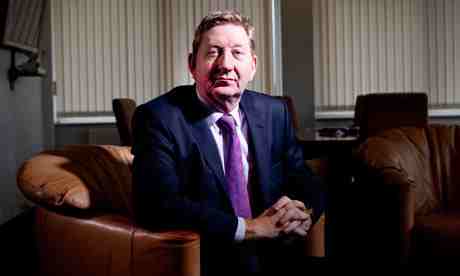
Better late than never!
‘McCluskey also revealed that membership of the Labour party among Unite members was probably at its lowest ever figure of around 12,000, which included 2,000 recruited this year through a campaign to attract more people into the party. McCluskey said Unite had seen a lot of activists become disillusioned with the party, especially in its new Labour period, and resign. “I almost did myself,” he added.’
The leader of Britain’s largest trade union has warned of a wave of public sector strikes over pay and pledged to escalate protests against austerity measures before the next general election.
Len McCluskey, general secretary of Unite, said there was a real likelihood of co-ordinated walkouts, less than a year after a dispute over pensions saw the biggest outbreak of industrial unrest since the 1970s. Speaking before the annual TUC conference next week, McCluskey said he would support any call for further strikes.
“I will certainly be supporting a call for co-ordinated strike action over pay,” said McCluskey, whose union has 1.5 million members including 250,000 public sector workers.
McCluskey said public sector employees had endured a three-year pay freeze and faced another two years of restraint, with pay increases in 2013/14 and 2014/15 to be capped at 1%. “That is scandalous. The attacks on public sector workers are unfair, and our members remain furious and angry. There is a real chance of co-ordinated industrial action, if not this winter, then early next year.” Unison, the biggest public sector union, has also called for strike action against George Osborne’s pay plans.
A motion put forward for the TUC conference by the Public and Commercial Services union calls for “co-ordinated strike action against cuts in pensions, pay and jobs this autumn.” Although that motion must go through the composite process where it is combined with contributions from other unions, some form of strike call is expected to be voted on by delegates. The PCS, the UK’s largest civil service union, is seeking strikes as soon as possible after a TUC-backed march in central London on 20 October dubbed “A Future that Works”, with hundreds of thousands of people expected to attend.
Around 1 million public sector workers took part in a one-day strike on 30 November last year against pension reforms, with some unions, including the PCS and Unite, keen to continue protests against reforms to public sector pensions.
McCluskey said he expected strikes and protests to increase as a general election approached in 2015. “I see the issue of strikes and protests actually increasing as we move closer and closer to a general election. It is the only way democracy can work when huge numbers of people disagree with what the government is doing.” Referring to last summer’s riots, McCluskey warned of the dangers of youth unemployment with 1 million 16-to-24-year-olds searching for work. “There is an anger that may drift to desperation and then obviously anything can happen.”
In a speech at the TUC conference, McCluskey will urge the government to raise the minimum wage by £1 to £7.19 and introduce a cap on energy bill increases. Describing the minimum wage hike as a “huge stimulus” that would not cost the taxpayer, McCluskey said: “There will be a huge injection of funds into the economy. We are talking about low-paid workers. If they get an additional £40 a week, they will be spending £40 per week, not putting any of it in the Cayman Islands.” McCluskey added that a fuel bill cap would also have a stimulatory effect by curbing hikes in fuel bills that are running at around £1,310 per year. “We have got energy companies making huge, huge profits. If the government is interested in being on the side of ordinary working people it would not be difficult to intervene and put a cap on that.”
McCluskey also revealed that membership of the Labour party among Unite members was probably at its lowest ever figure of around 12,000, which included 2,000 recruited this year through a campaign to attract more people into the party. McCluskey said Unite had seen a lot of activists become disillusioned with the party, especially in its new Labour period, and resign. “I almost did myself,” he added.
guardian.co.uk © Guardian News & Media Limited 2010
Published via the Guardian News Feed plugin for WordPress.

and I take it they will want Public Support on this? well i hope they do but how about the Unions Supporting the Public who are being treated to loss of benefits, forced out their homes and put deeper into Poverty
Spot on,If the people do not wake up and take the control of the country/world back we will be slaves to a few big Corperations that will run everything as they do the elections at the present time .Private funding =Small choice =Pre destined leaders =Pre determined polocies = Total control = Freedom ,opinions ,activity,ocupation ,income & future pre-ordained within set perameters.We are at one of the most critical times in the history of mankind but many seem oblivious or are keeping their head down hoping they wont be next.I hate to say it but unless we put the companies under control of the people we are screwed.
And the millionaires who are running the country need to know that we will not put up with their “we are in it together” crap.
Dave